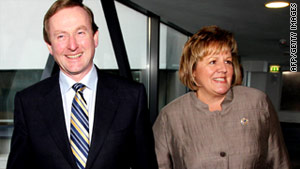Ireland's ruling party suffers worst defeat ever in vote

- Opposition party Fine Gael on top in early returns
- Economic woes behind turn in votes
- New government can't drop austerity measures
(CNN) -- The main opposition party in Ireland, Fine Gael, is claiming victory in the country's first general election since it accepted a multibillion-dollar financial bailout last year.
The poll -- held Friday with the votes counted over the weekend -- has produced a huge swing against the main ruling party Fianna Fail, which has slumped to its worst ever election showing.
Fianna Fail has ruled Ireland for 60 of the last 80 years, but has been hit hard by the fall-out from the economic bail-out and subsequent austerity measures.
Irish prime minister Brian Cowen was so unpopular he had to step down as leader of Fianna Fail before the poll.
The new prime minister is set to be the Fine Gael leader, Enda Kenny, although the center-right party may have to form a coalition with the center-left Labour Party to take power. Kenny had made it clear he would try to renegotiate the terms of the international bail-out.
However, given the dire state of the country's public finances, the new government will have no option but to continue with austerity measures.
The 2011 election race is signaling a dramatic change in the landscape of Irish politics as Fine Gael, Sinn Fein and independents make gains -- at the expense of Fianna Fail.
The Sinn Fein president, Gerry Adams, gambled his political future by moving from Northern Ireland to stand in an election in the Republic for the first time. He has scored a significant victory, topping the
poll in his constituency of Louth on the first count in the proportional representation election.
Adams predicted his party would double its number of seats and said the election results represented "a new era" for Irish politics.
The Dublin government negotiated an E85 billion ($113 billion) loan package in December from the European Union, International Monetary Fund and individual European nations, as the crippling cost of bailing out its banks during the financial crisis took its toll on national coffers.
